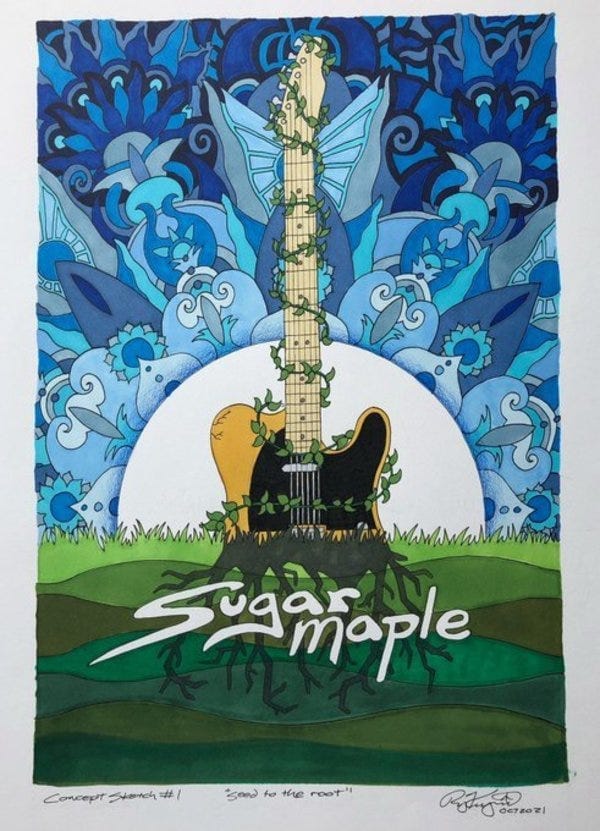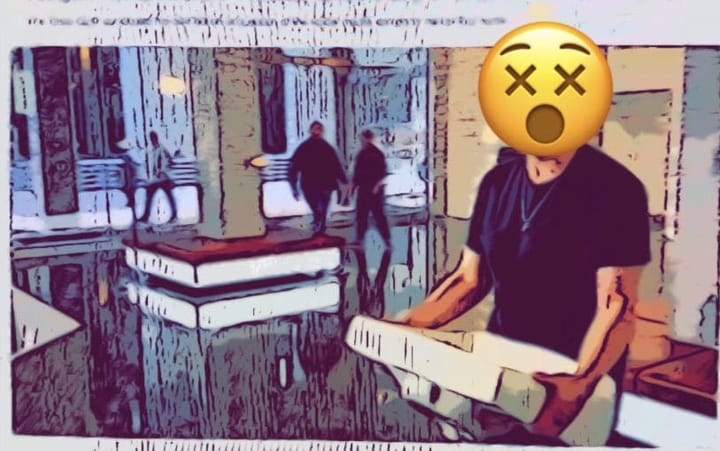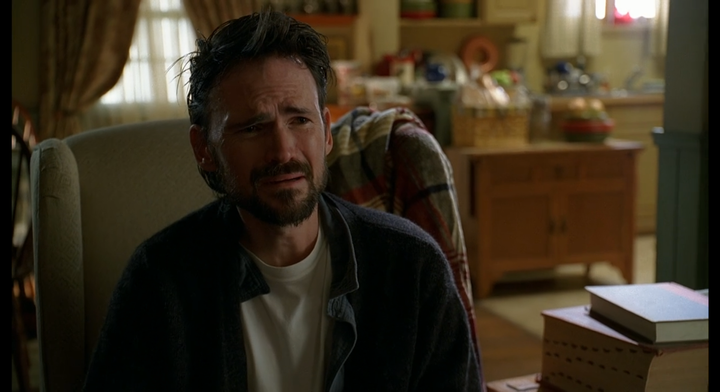Sugar Maple Is Here!
“Sugar Maple,” a fantastical fictional musical podcast, released weekly, about a guitar of legend that passes from hand to hand through the ages.

Note: this essay was originally published on Revue on March 14, 2022.
We now interrupt our regularly scheduled newsletter programming.
I’m going to be on family vacation all weekend, so my planned follow-up to One About The Atmosphere will have to wait.
More importantly … SUGAR MAPLE IS HERE.
Well, it’s here tomorrow, anyway, and for the next 7 Tuesdays thereafter.
Get it on Apple Music.
Get it on Spotify.
Or go to your favorite podcast place and search “Sugar Maple” and I bet you you’ll find it.
I’ll write more about it soon. For now, please enjoy this rerun newsletter, about how Sugar Maple came to be.
____
OK, the world is a bit of a horror show and I’ve been writing at length on heavy matters. Let’s make this one a little light.
How about I tell you a bit of background about my latest project?
It all started with my last project, the novel The Revisionaries, which itself started life as a writing project between me and my friend, Ben. I’ve written about that extensively here, so enough about that. The relevant thing about that bit of information is that back when we were writing it, we used an everything-but-the-kitchen-sink approach, when it comes to influences. In fact, I’d say we also used the kitchen sink.
The kitchen sink for me means the Phish albums “Hoist” and “The Story of The Ghost,” lyrics mostly by Tom Marshall. If you listen to them, you’ll find there’s a Julius in there. Also, harder to find (appropriately enough, as you’ll know if you’ve read the book), there’s a Gordon.
I love Tom Marshall’s lyrics. They’re bizarre and surprising, surreal and funny, they don’t try to take themselves too seriously and as a result they often seem silly, right before taking an unexpected turn into the profound. Most of all, their impressionistic nature creates a zone of subjectivity that allows each listener to construct their own meaning, which meshed well with key themes I was exploring as I wrote the thing that eventually became The Revisionaries.
You might say that with The Revisionaries I hoped to craft something bizarre and surprising, surreal and funny, that doesn’t try to take itself too seriously, which as a result often makes it seem silly right before it takes an unexpected turn into the profound. I’d say it’s accurate to say that Tom Marshall’s a creative influence.
Came a day my novel got published. A couple weeks thereafter, came a day when Ben texted me words to the effect of “hey, the head of Osiris Media, RJ Bee, is following you on Twitter.”
This was exciting news. I knew Osiris, and maybe you do too. If not, I’ll tell you: it’s a podcasting network that tells deep-diving musical stories through a series of excellent and well-produced podcasts, featuring voices both prominent and little-heard from the various music scenes they contemplate.
In other words, they make good things for people’s ears, about people who make good things for people’s ears.
Ben’s advice was sound: “Given that RJ is the head of Osiris Media and Tom Marshall is his business partner, and given that Tom Marshall is a clear influence, you ought to offer to send them copies of your book.”
So I did that, and RJ took me up on it, and he read my book on the airplane down to see Phish in Mexico, and one of my creative influences had a copy of my book, and that would have been more than enough of a wonderful story for me.
But, as sometimes happens, it was only the start.
A year ago this week—about 11 months after I sent Osiris those copies—I got a DM from RJ. He was interested in developing fiction podcasts for Osiris and wanted to pick my brain about it.
I was, of course, interested. And Ben and I, deep in the pandemic doldrums, had been talking about doing some sort of podcast about story. (Of course we were talking about making a podcast during the pandemic. We’re middle-aged white dudes; it was the law.)
Before long, Ben and I were scheduled to take a call with RJ, which Tom was likely to attend. Our feeling was, hey, whatever happens here, we’ll have met a creative influence and maybe talked creatively with some people whose opinions and outlook we enjoy and respect. That would be more than enough of a wonderful story for us.
We didn’t have a clue.
I’m going to fast-forward now and say that it became quickly apparent over the next few weeks of discussions, that what the Osiris team wanted to accomplish was something far more ambitious and amazing than anything we could have anticipated.
They didn’t want to make a few people on mics doing a podcast with a fictional premise.
They wanted to make a literary fiction podcast, something that pointed toward prestige television. They wanted to make an electrifying tale that spanned decades, that told a new compelling story each week, each in a different register, each with a different cast, all connected by a unifying story that unfolded episode by episode.
And they wanted to make it a musical.
And they wanted Don Hart—legendary Nashville composer and arranger, recent architect of Phish frontman Trey Anastasio’s recent Beacon Street shows—to be the musical director.
And they wanted Fred Savage to star.
And they wanted musicians to write songs for each episode, musicians such as …
Well. I have to keep some secrets.
And … they were wondering if Ben and I might want to write it.
What did we think?
What did we think? We thought yes. What do you think we thought?
The only reason to say “no” was the terror.
The terror was real.
Have you ever been the rookie on a team of pros? After the last year I can say for certain: I sure have. The Osiris team are pros. They know what they’re doing, and they know how to make a very good podcast. So, if you’ve never made any sort of podcast whatsoever, that can create terror.
The best thing to do when you’re terrified is to run very fast and diligently, in the most productive direction you can find. It’s a pretty good method, especially if your partners are not only terrifyingly good at their jobs, but also collaborative and kind and patient and welcoming guides. Which, I’m pleased to say, they both were and are.
Ben and I went to work. Ben’s superpower is throwing things at the wall that stick. My superpower is being a sticky wall; that and coming up with good character names.
So that’s what we did for several months. Ben threw things, I caught them. We made choices, and shaped the general ideas into particulars. We’d show Tom what we had made, Tom told us what he thought, we refined and shared with the Osiris team, they told us what they thought we went back, iterated, and repeated this until we had the concept refined.
Then we wrote scripts. I wrote some. Ben wrote some. This was hugely exciting but it’s hard to make this actual process narratively compelling. It basically sounded like this: tappa tappa tappa tappa tappa.
We discovered we like writing scripts.
We discovered all the challenges of writing scripts for an audio-only medium.
Then came editing, which is necessary and exhilarating but also excruciating and boring and I’ll maybe write about it sometime at length when I have a toothache. Then rewrites. Then more editing. More rewrites. More editing.
It doesn’t sound fun, but it was.
Finally we had scripts.
And this would have been more than enough of a wonderful story for us.
But then … oh my God, you guys, then? The scripts started getting made.
Getting your scripts actually produced is a privilege that I’m aware many writers don’t get to experience, and all I can say is this: it’s a privilege that I am enjoying to an almost unseemly degree.
We started to hear songs—real songs, good ones—with titles we’d made up. Voices of skilled actors speaking words we’d written, and making them sound better than they ever had in our heads. There was a moment on Ben’s porch last May, as we worked out the final episode, when something got sent to us from the production team that … oh boy. I can’t tell you yet, but it was a moment in time. One to remember. I’ll get back to you on that one. It rolled over my soul.
I’ve heard things, you guys. Amazing things. I can’t wait for you to hear them. I’ve met characters I can’t wait for you to meet, and a story of a very peculiar guitar named Sugar Maple and of its many owners: the orphan who bought it … and the virtuoso hambone man … the legend … the devil who disappeared, and the country girl who escaped … the child who spoke with a tongue of fire, and the bird who rose from the ashes … and, finally, one who returned to tell the tale.
There’s a few more months to go.
But for now, you can hear just a little bit. A montage of the first three Sugar Maple songs, from the first three episodes, each from a different genre: a classic rock n’ roll, a blues, and a Motown rager. In about 5 minutes, you’ll get an idea of the level of professionalism and skill that went into this.
I love ‘em.
The world is not looking great right now. But we got nowhere to go. So let’s make art and enjoy it. Maybe we can make something new that can make a difference.
And you know what? Never mind the advice to never meet your heroes. Meet your heroes. Life is short, and sometimes it really does work out.
Sugar Maple comes out tomorrow.
Stick. Around.
_____
A.R. Moxon is the author of The Revisionaries, which is available in most of the usual places, and some of the unusual places. He came out on top by the luck of the draw.




Comments ()